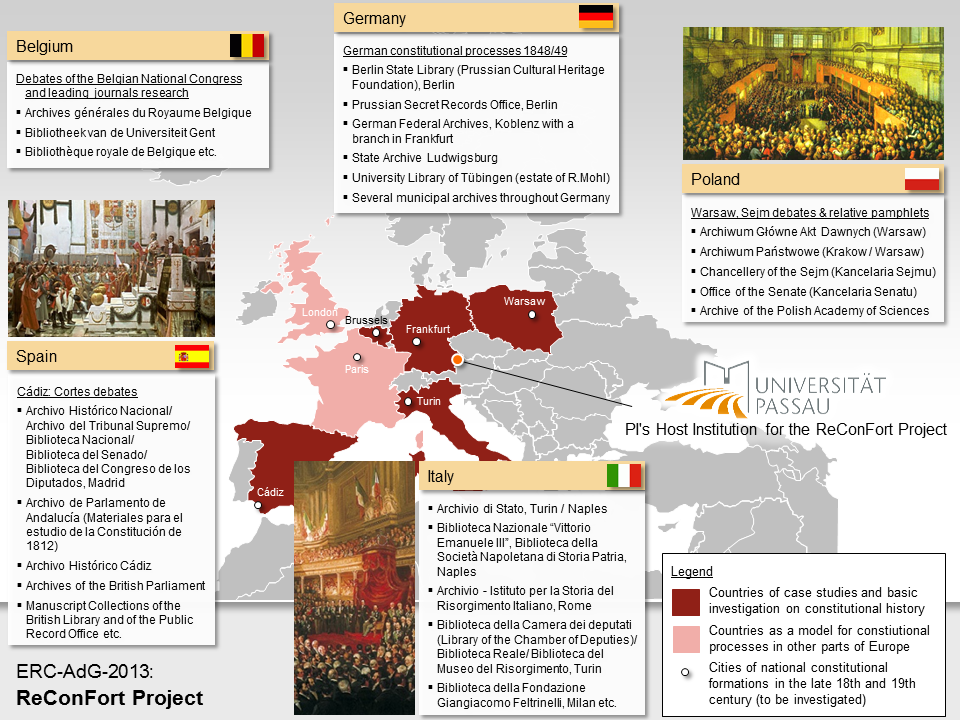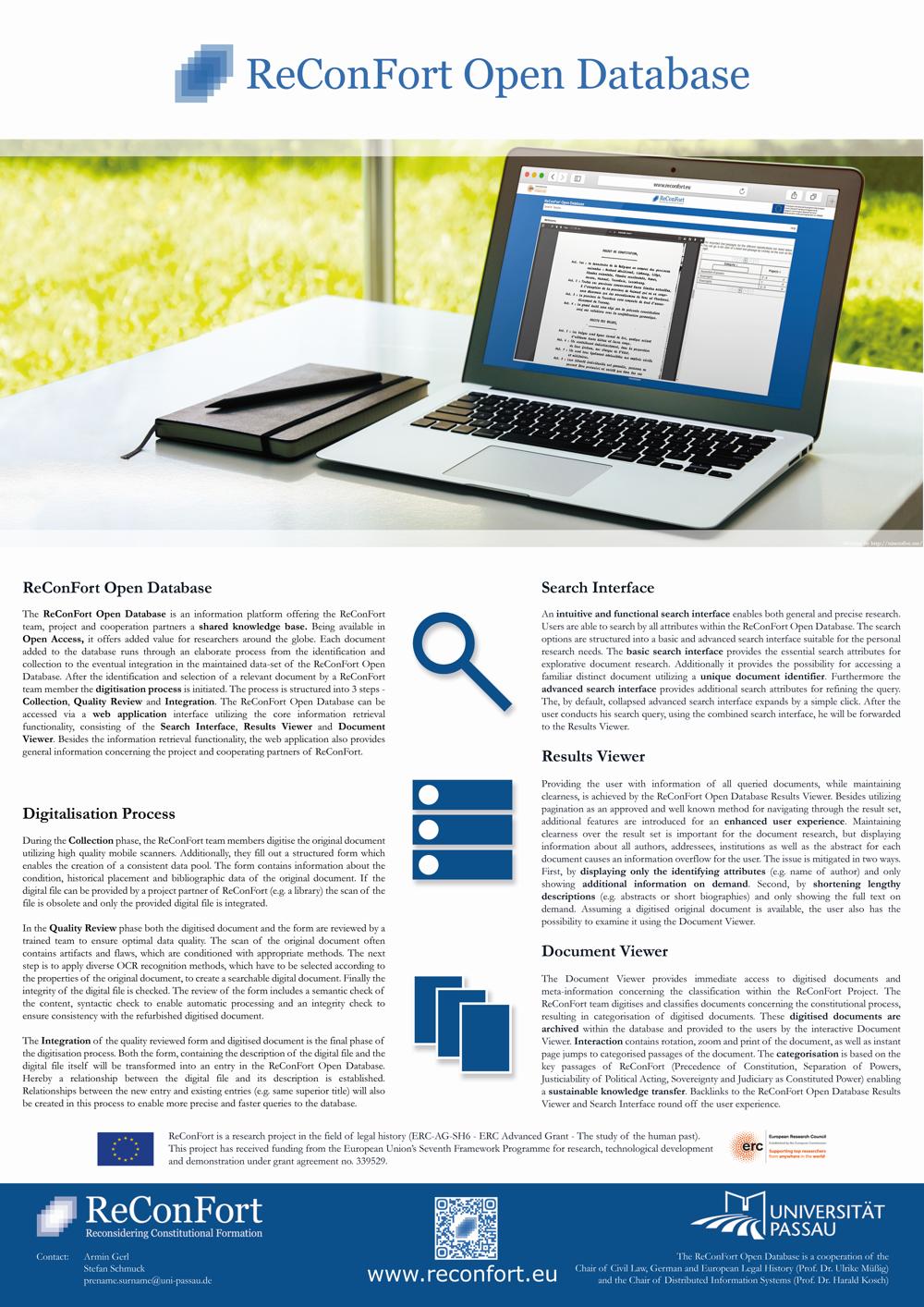Seven graduated historians and legal scholars from Belgium, Germany, Great Britain, Poland, Italy and Spain conduct research under the supervision of the principal investigator Prof. Dr. Ulrike Müßig (University of Passau) on Constitutional Communication by drafting, practice and interpretation in 18th and 19th century Europe.
The project aims at investigating the cross-border interplays between constitutional process and public debates in late 18th and 19th century Europe. Constitution is not only the body of text, but rather the consensus of those to be ruled by the constituted sovereignty.
ReConFort understands constitution as an evolutionary achievement assessing the interplay of the constitutional text, societal context, political practice and constitutional interpretation.
The guiding principle of ReConFort is to find “discourse”-related explanation models for the rather paradigmatic experimental nature, ambiguity or indetermination of constitutional texts with regard to state-organisational core elements (i.e. power-balance of the pouvoirs constitutés, monarchical or popular sovereignty).
The legal implications of the circulation of ideas and constitutional notions become more evident for the first time at the interface of legal and historical sciences.
After the emergence of the American Constitution (1787), the genesis of constitutional semantics was accompanied by an immense public interest and participation in Continental-Europe. Against this backdrop, the interplay of linked paradigms reveals the European constitutionalism as a history of movements. ReConFort concentrates on the public “discourses” by selecting five constitutional case studies, i.e. the Polish Sejm (1788-1792), the Spanish Cortes (1812), the Belgian National Congress (1830-1831), the Frankfurt Parliament (1848-1849) and the Italian Parlamento Subalpino (1861).
The reconsidering of the constitutional processes of the late 18th and 19th centuries is based on the exploration of mainly still unknown primary sources (cross-border correspondences and publicist activities of major constitutional protagonists (including exile literature) and regional/national and cross-border constitutional journalism in leading public media). The interconnected synchronic and diachronic comparative approach of ReConFort sheds light on the complex mechanisms of constitutional formation and their generalisation. This is meant to contribute to the contemporary overall debate about the future of the EU integration process.
On the basis of so far unknown historical sources, ReConFort pushed the frontier beyond the state-of-the-Art. National sovereignty in Polish debates around the Great Sejm is seen in the light of aristocratic republicanism and the procedural openness of the Polish May Constitution 1791. Within the anti-Napoleonic context of the Cádiz’ constitutional formation the liberal understanding of national sovereignty combines the supra-legal limitations for the royal government with the historical legitimization by the old fundamental laws of the Monarchy. In Belgium, a parliament took over the task of drafting a constitution after the Revolution of 1830, leaving the soon-to-be-appointed King only the role of ‘pouvoir constitué’. In the octroi of the Piedmontese Statuto Albertino 1848, the constituent act of granting the fundamental law was communicated to maintain the plenitudo potestatis of the absolute monarchy, to rationalize the old royal sacredness. The Italian coincidence of the monarchical sovereignty in its absoluteness with the granting of the Albertine Statute was meant to avoid any scope for the differentiation between pouvoir constituant and pouvoir constitué. The improvised parliamentarism in the Frankfurt National Assembly on the basis of a ‘constitutionalist’ constitution corresponds with the openness of the ‘sovereignty of the nation’ whereby Heinrich von Gagern inaugurated the Paulskirchen-assembly. This avowal to the singular and unlimited pouvoir constituant of a non-existing German nation does not make sense as a programmatic claim to self-government, but reflects the indecisiveness of the post-kantian liberalism between monarchical and popular sovereignty. It avoided the open commitment to popular sovereignty and thus the conflict with the monarchy, enabling a consensual framework between imperial government and parliamentary majority.
The set of key passages ‘national sovereignty/constituent sovereignty’, ‘precedence of constitution’, ‘judiciary as constituted power’ and ‘justiciability of politics’ together with the remotely-based working organization of the international post-doc group enables ReConFort to combine comparative constitutional history and transfer history, which opens up a framework to establish European constitutional models attractive for Arabic and Asiatic neighbors for the current challenges in the Middle East and North Africa.

The Advanced Grant ReConFort (Reconsidering Constitutional Formation, Constitutional Communication by Drafting, Practice and Interpretation in 18th and 19th century Europe) brings together post-docs from Belgium, Germany, Italy, Spain and Poland. The project focuses on constitutional formation as interplay of constitutional text, societal context, political practice and interpretation.
The historical constitutional discourses in the Sejm (Poland), the Cortes (Spain), in the Belgian National Congress, the Paulskirche (Germany) and the Parlamento Subalpino (Italy) illustrate perfectly how the legal codification of a political system in a constitution communicates authority in the context of a society. Almost 200 years ago, constitutional discourse was closely accompanied by the public, a circumstance which contributed its success in 18th and 19th century Europe and which is arguably missing in contemporary European Union contracts.

This project has received funding from the European Union’s Seventh Framework Programme for research, technological development and demonstration under grant agreement no. 339529.
ReConFort is a research project in the field of legal history (ERC-AG-SH6 - ERC Advanced Grant - The study of the human past).